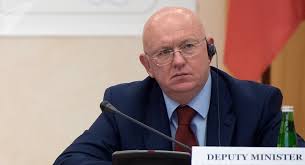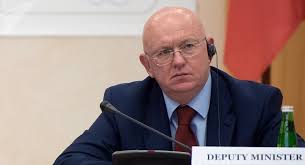
Russia’s UN envoy blasted the UK’s attempt to blame the poisoning Sergei and Yulia Skripal on Moscow, describing the entire hoax as a “theater of absurd.”
The extraordinary UN Security Council meeting was requested by Russia, following the announcement made by the secretive British Porton Down chemical laboratory, that it had not established that the Novichok nerve agent used in the poisoning was of Russian origin.
According to RT, top British officials explicitly cited the Porton Down laboratory when pinning the blame on Moscow, so following this revelation their theory started to fall apart, said Vasily Nebenzia, noting that the UK’s secret agencies rushed to help the government, producing new claims based on some “intelligence data.”
Nebenzia asked a series of questions pointing to inconsistencies of the UK’s narrative.
I don’t even know how to comment on this. It’s some sort of the theater of absurd. You couldn’t have come up with better fake story?
Why did we have to wait eight years and [then] decided to [attack the Skripals] two weeks before the elections and several weeks before the world cup? Why did we release him from the country in the first place? Why do that in extremely public and dangerous fashion.
The fact that the victims of the nerve agent, which is believed to be among the deadliest, managed to survive the attack has also raised serious questions, Nebenzia said.
As RT reports, it could be explained only if an antidote had been administered to them immediately after the exposure. British officials, however, insisted that no antidote was used, since none existed in the first place. The Skripals managed to walk around for four hours after the exposure, according to the version by the British authorities, yet the police officer who found them lost consciousness immediately.
There are also different versions of how the poison was delivered, leaked and speculated in the British media.
‘There are so many versions in wake of the lack of facts and evidence. House of Skripal, the door knob, flowers, buckwheat, or, in fact, the bay leaf?’ Nebenzia said.
As the cornerstone allegation that the nerve agent originated from Russia turned out to be without merit, the whole narrative fell apart, Nebenzia said. Arguments that the Novichok nerve agent family originates from Russia, and therefore it was Moscow to blame do not hold water either, the diplomat added.
‘We want to state urbi et orbi, Novichok is not copyrighted by Russia,’ he stressed.
While the British authorities try to make fun of different theories expressed by Russia-based experts and media, Nebenzia said, Moscow does not have any version of the events due to glaring lack of facts available.
The Russian diplomat stated that the level of intellectual justification used by the UK authorities, namely by the Foreign Secretary Boris Johnson, ‘does not invoke even a smile.’
‘Boris Johnson, who constantly proclaims his Russophile [nature], produces an absurd, to use the nicest word I can, absurd and immoral premise that the incident was necessary for Moscow to bring the people together before the [presidential] elections,’ Nebenzia stated.
‘His comparison of Russia’s Football World Cup with the Berlin Olympics of 1936 was equally immoral,’ he continued, adding that unlike the Soviet Union, a large British delegation took part in those Games.
UK envoy Karen Pierce stood by her government’s firm belief that there is ‘no plausible alternative explanation’ and that that Russia was ‘highly likely’ behind the Salisbury incident. She called it part of a ‘wider pattern of irresponsible Russian behavior’ and accused Moscow of constant ‘aggression’ over the recent years.
‘Russia seeks to undermine the international institutions which have kept us safe since the end of the Second World War,’ Pierce said.
The two envoys also resorted to literary references in sparring with each other, with Nebenzia illustrating the British position by quoting the Red Queen from Lewis Carroll’s Alice in Wonderland, who demanded ‘sentence first, verdict afterwards.’
Pierce retorted that another quote from the same book, about ‘believing six impossible things before breakfast,’ suited her Russian colleague better, though it matched her own government’s case built on assertions and rhetoric.
All of which, as Tom Luongo suggests, points to the imminent demise of May’s government.
The United Kingdom is headed for a break-up. Not today or tomorrow, mind you but, sooner than anyone would like to handicap, especially in this age of coalition government at any cost.
By responding to the alleged poisoning of former Russian double agent Sergei Skripal and his daughter Yulia with histrionics normally reserved for The View, Theresa May’s government has set the stage for its own collapse.
Government’s fall when the people lose confidence in them. May has bungled everything she has touched as Prime Minister, from Brexit talks and her relationship with Donald Trump to her response (or lack thereof) to the escalating level of domestic terrorism and her pathetic campaign during last year’s snap election.
When I confront such obvious ineptitude it’s not hard to believe that wasn’t the plan to begin with.
Since her initial meeting with Donald Trump after his election where it looked like the two would get along, May has become more and more belligerent to both him and his base. While he continues to affirm our special relationship “The Gypsum Lady” as I like to call her makes mistake after mistake.
The latest of which is pushing everyone east of the Dneiper River in Ukraine to denounce the Russians and President Vladimir Putin personally for this alleged poisoning in Salisbury a month ago.
The result of which was the largest round of diplomatic expulsions in a century, if not ever.
And now that the whole “Russia did it” narrative has been skewered by May’s own experts at Porton Downs, she stands alone along with her equally inept and embarrassing Foreign Secretary Boris Johnson and Defense Secretary Gavin Williamson.
The calls for their jobs will only intensify here.
Reprinted with permission from The Duran.

